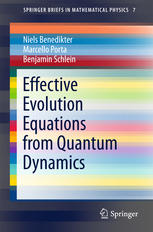

Most ebook files are in PDF format, so you can easily read them using various software such as Foxit Reader or directly on the Google Chrome browser.
Some ebook files are released by publishers in other formats such as .awz, .mobi, .epub, .fb2, etc. You may need to install specific software to read these formats on mobile/PC, such as Calibre.
Please read the tutorial at this link: https://ebookbell.com/faq
We offer FREE conversion to the popular formats you request; however, this may take some time. Therefore, right after payment, please email us, and we will try to provide the service as quickly as possible.
For some exceptional file formats or broken links (if any), please refrain from opening any disputes. Instead, email us first, and we will try to assist within a maximum of 6 hours.
EbookBell Team

5.0
108 reviewsThese notes investigate the time evolution of quantum systems, and in particular the rigorous derivation of effective equations approximating the many-body Schrödinger dynamics in certain physically interesting regimes. The focus is primarily on the derivation of time-dependent effective theories (non-equilibrium question) approximating many-body quantum dynamics. The book is divided into seven sections, the first of which briefly reviews the main properties of many-body quantum systems and their time evolution. Section 2 introduces the mean-field regime for bosonic systems and explains how the many-body dynamics can be approximated in this limit using the Hartree equation. Section 3 presents a method, based on the use of coherent states, for rigorously proving the convergence towards the Hartree dynamics, while the fluctuations around the Hartree equation are considered in Section 4. Section 5 focuses on a discussion of a more subtle regime, in which the many-body evolution can be approximated by means of the nonlinear Gross-Pitaevskii equation. Section 6 addresses fermionic systems (characterized by antisymmetric wave functions); here, the fermionic mean-field regime is naturally linked with a semiclassical regime, and it is proven that the evolution of approximate Slater determinants can be approximated using the nonlinear Hartree-Fock equation. In closing, Section 7 reexamines the same fermionic mean-field regime, but with a focus on mixed quasi-free initial data approximating thermal states at positive temperature.